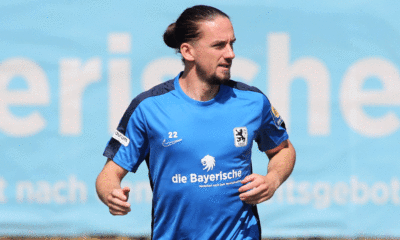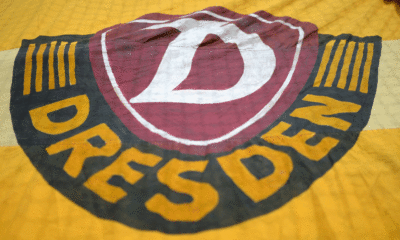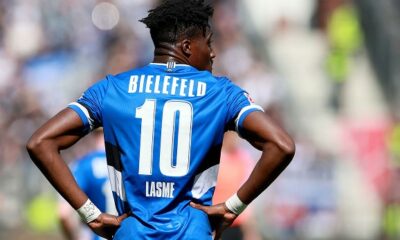Bundesliga
Why is Borussia Dortmund celebrating its title at Borsigplatz?
Published
11 months agoon
By
Maria Keane
If Borussia Dortmund still overtakes FC Bayern Munich on the last two matchdays, there will be another huge party at Borsigplatz. Why there?
The Borsigplatz northeast of the center of Dortmund is actually a large roundabout. Filled with a meadow and trees. Intersected by rails of line U44. Surrounded by kebab shops and barber shops, by a social service and a nut shop called Muskara. There is usually not much going on here. Unless Borussia Dortmund happens to have something to celebrate.
While most clubs hold their title celebrations in front of the town hall of their respective city – FC Bayern Munich, for example, at Marienplatz and Eintracht Frankfurt am Römer – in Dortmund they go to Borsigplatz. As a highlight of the parade, the players and coaches take a few laps around the roundabout on a bus or truck and are cheered on by thousands of fans while always keeping an eye on the place where their club was founded.
The building at Oesterholzstraße 60 is the reason why BVB celebrates its title at Borsigplatz of all places. There was once the “Zum Wildschütz” inn, where 18 men founded the Borussia ball game club on December 19, 1909. “Borussia” by the way, because that’s the name of the beer served there.
BVB: An ex-ultra now lives in the founding room
The “Zum Wildschütz” inn has long since disappeared. On the ground floor there is now a snack bar with the ungrateful name “Pommes Rot-Weiss”. Jan-Henrik Gruszecki lives above it. He was a founding member of the Dortmund ultra group “The Unity”, was once also a member of the management team of the “Desperados” and now works as head of the strategy and culture department for his favorite club.
In 2015, while he was a freelance journalist, Gruszecki and his friends made a film about the founding history of BVB and in the process came across the “Zum Wildschütz” inn. In the documentary “Born on Borsigplatz” the restaurant naturally plays a major role, but now also in Gruszecki’s life.
Shortly after the film research, the premises were foreclosed on and Gruszecki struck. “Sometimes when I unlock the front door, I think: That’s awesome. You live in a historic property,” he said at the time New Westphalian. “The room where Borussia Dortmund was founded in 1909 is now my living room.”
BVB: From Borsigplatz to the south
It used to be that Gruszecki would not have had far to get to his favorite club’s stadium from here. BVB played its first games in a field a few streets away. He later moved to a sports field in today’s Hoeschpark, named after the Hoesch AG industrial plant. The field was initially called “White Meadow”, in 1924 it was expanded into a stadium with a capacity of 10,000 spectators.
When the National Socialists ordered an expansion of the steel-producing Hoesch AG in 1937 as part of their war preparations, BVB had to give way. The Rote Erde stadium in the south of the city became their new home. The Westfalenstadion was later built right next to it. BVB only experienced great success after leaving their home country – but the club always returns for the celebrations.
BVB at Borsigplatz: Ottmar Hitzfeld with the handle pot
In 1956, players and fans were able to celebrate a major title at Borsigplatz for the first time, the first championship in the club’s history. More championship titles and cups followed in the course of the 1950s and 1960s, before drought prevailed until the DFB Cup victory in 1989. In 1995 coach Ottmar Hitzfeld finally brought the championship trophy back to Dortmund. “What you experienced in the city and during the move at Borsigplatz was unimaginable,” Hitzfeld later told the fanzine chat yellow.
“I saw so many old people painted black and yellow with their shirts on and looking out of the houses, happy. It wasn’t just the younger fans, it was also the older people who were at the windows, looking down everywhere and I don’t know how many hundreds of thousands were out and about in the city, it was overwhelming.” After the Champions League victory in 1997, Hitzfeld was the only coach to date to lift the pot on the Borsigplatz.
BVB at Borsigplatz: Jürgen Klopp brings the double
Jürgen Klopp led BVB to the championship title in 2011 and the following season to the first double in the club’s history. “Even tears came to my eyes at Borsigplatz,” he later confessed. “The bowl around Borsigplatz is still one of the great highlights of my career.”
BVB at Borsigplatz: Thomas Tuchel and the last time
In 2017, Thomas Tuchel was allowed to go to Borsigplatz with his victorious DFB Cup winners. To this day it is the last Dortmund title celebration with cheering crowds.
At the time of the DFB Cup victory in 2021 under Edin Terzic, there were strict corona requirements. The team had to skip the parade. Nevertheless, a few hundred fans made the pilgrimage to Borsigplatz, torched a few Bengali fires and thus triggered a police operation.
BVB at Borsigplatz: Return in 2023?
Should BVB overtake FC Bayern in this year’s final sprint for the title, the Borsigplatz would be full again for the first time in six years. Dortmund is a guest at FC Augsburg on Sunday and will host FSV Mainz 05 on the last day of the game. FC Bayern still has one home game to play against RB Leipzig and one away game against 1. FC Köln. Two games before the end of the season, Dortmund are one point behind with a worse goal difference.
Bundesliga: The top group before matchday 33
| Place | team | Sp. | Gates | differential | pt. |
| 1. | Bayern Munich | 32 | 89:34 | 55 | 68 |
| 2. | Borussia Dortmund | 32 | 78:42 | 36 | 67 |
| 3. | RB Leipzig | 32 | 57:38 | 19 | 60 |
| 4. | Union Berlin | 32 | 48:34 | 14 | 59 |


Test match tournament on free TV and live stream
In preparation for the upcoming start of the season in the 2nd and 3rd divisions, SpVgg Unterhaching is organizing a...


Test match on free TV and live stream
Third division club Dynamo Dresden are testing today against top Czech club Slavia Prague in preparation for the upcoming start...


When does the season start?
It’s warm and sunny outside, but you just want to watch football again? Then get in the mood for the...

